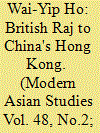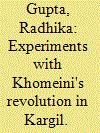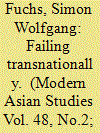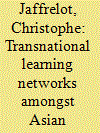|
|
|
Sort Order |
|
|
|
Items / Page
|
|
|
|
|
|
|
| Srl | Item |
| 1 |
ID:
131784


|
|
|
|
|
| Publication |
2014.
|
| Summary/Abstract |
The madrasa, the Islamic institution of learning, has for centuries occupied a central role in the transmission of religious knowledge and the shaping of the identity of the global Muslim community (umma). This paper explores the sharp rise in the number of madrasas in contemporary Hong Kong. It examines, in particular, how South Asian Muslim youth, after receiving a modern education in a conventional day school, remain faithful to their religious tradition by spending their evenings at a madrasa studying and memorizing the Qur'an. Engaging with the stereotypical bias of Islamophobia and national security concerns regarding the ties of madrasas to Islamic terrorist movements over the last decade, this paper argues that the burgeoning South Asian madrasa networks have to be understood in the context of Hong Kong's tripartite Islamic traditions-South Asian Muslim, Chinese Hui Muslims, and Indonesian Muslims-and within each Muslim community's unique expression of Islamic piety. Furthermore, the paper also identifies factors contributing to the increase in madrasas in Hong Kong after the transition from British colonial rule to China's resumption of sovereign power in 1997.
|
|
|
|
|
|
|
|
|
|
|
|
|
|
|
|
| 2 |
ID:
131783


|
|
|
|
|
| Publication |
2014.
|
| Summary/Abstract |
Shi'i scholars from India have been a sizeable presence in seminaries in Iran and Iraq, both historically and today. Yet there is a dearth of scholarship on Shi'i linkages between India and West Asia, with the exception of historical work on the patronage of shrine cities in Iraq by centres of Shi'ism in India. Departing from this geographical and historical focus, this paper lends insight into contemporary religious networks between India and West Asia, using the example of the Twelver Shi'a in Kargil, a region located on India's 'border' with Pakistan in the province of Kashmir. Kargili scholars travelled overland via Afghanistan or by sea from Bombay to Basra to study in seminaries in Iraq and Iran from the nineteenth century onwards. Increasing fluency in Urdu in post-colonial India enabled them to connect with Shi'i institutions in other parts of India, which mediate religious, cultural, and financial flows from a transnational Shi'ite realm. These networks of religious learning are not only conduits for the transmission of textual, doctrinal knowledge, but also for politico-religious ideologies that are selectively harnessed, and often exaggerated, to effect significant social and political changes in micro-locales. While local conflicts are over-determined by the evocation of transnational links, they also reflect, even if only through rhetorical and partial reproduction, doctrinal and politico-religious schisms among Shi'i leaders in West Asia. This is illustrated by an ethnographic account of the activities undertaken and contestations provoked by the Imam Khomeini Memorial Trust in Kargil, a modernist reform movement that has selectively appropriated Khomeini's revolutionary ideologies to instigate social change and shape local politics and religious practice in Kargil.
|
|
|
|
|
|
|
|
|
|
|
|
|
|
|
|
| 3 |
ID:
131785


|
|
|
|
|
| Publication |
2014.
|
| Summary/Abstract |
This paper adds to the growing literature on transnational Shi?ism which has so far mostly focused on social history and political contestations. By tracing the thought, transnational legacy, and ultimate failure of the reformist Shi?i scholar, Muhammad al-Khalisi (d. 1963), I argue for the crucial importance of local contexts and ideas for the genesis of Islamic modernist projects. In his native Iraq, al-Khalisi not only distinguished himself as a guerrilla fighter and political activist but also was shaped by prevailing notions about the compatibility of Islam and science. Exiled to Iran for his opposition to the British from 1922 to 1949, he encountered there specific medicalizing discourses on modernity. This exposure and his experience as a practitioner of medicine in the Iranian countryside led al-Khalisi to identify medicine as the master key to unlocking the secrets of the divine law, the shari?a: his major work on Islamic law singles out human health as God's supreme concern. Back in Iraq during the 1950s, al-Khalisi's medical-scientific vision of modernity was finally complemented with an uncompromising call for intra-Muslim unity. This stance led to furious attacks against al-Khalisi which continue unabated in contemporary Pakistan where his name has become a term of abuse.
|
|
|
|
|
|
|
|
|
|
|
|
|
|
|
|
| 4 |
ID:
131786


|
|
|
|
|
| Publication |
2014.
|
| Summary/Abstract |
Tablighi Jama'at is one of the most popular Islamic purist movements in the world. Although it has a growing presence in Indonesia, the world's largest Muslim country, little research has thus far been done on its activities in that country. To gain access to Indonesian society, the Tablighi Jama'at has been particularly original in choosing a uniquely Indonesian institution as its entry point: the pesantren (Islamic boarding schools). The role of pesantren for the Tablighis in Indonesia is not confined to spreading Islamic knowledge, they also serve as a hub of Tablighi activities. This paper focuses on examining the role of the Tablighi pesantren in shaping and transmitting religious knowledge to its Indonesian followers, and in particular to female followers, as there is to date no scholarship on this topic. It analyses the life experiences of female Tablighis inside and outside the pesantren and their passion to belong to a global imagined Tablighi community. Transnational travel of female Tablighis from diverse neighbouring countries is a central part of the pesantren experience. For Indonesian Tablighi women, the presence of these female guests and foreign students who are enrolled in the pesantren play a significant role in strengthening their passionate desire to be part of the global Tablighi Jama'at umma.
|
|
|
|
|
|
|
|
|
|
|
|
|
|
|
|
| 5 |
ID:
131782


|
|
|
|
|
| Publication |
2014.
|
| Summary/Abstract |
During the nineteenth century, many Sino-Muslim scholars were seeking a more robust relationship with their Arab co-religionists. The efforts of Ma Dexin ??? (1794-1874) exemplify this shift to strengthen ties with the Muslim community outside China and situate Sino-Islamic scholarship in widespread Islamic discourses. Ma's writings provided Sino-Muslims with discursive and pragmatic tools for engaging a global Muslim community. For Ma, Muslim cooperation was negotiated through the means of religious education, which was enabled through travel and language. In this paper, I demonstrate how Ma Dexin modelled the importance of global connections of inter-Asian networks of religious learning by exemplifying the value of Middle Eastern travel and fluency in Arabic. I employ Ma's Chinese and Arabic written works in relation to those of Wang Daiyu ??? (circa 1590-1658) and Liu Zhi ?? (circa 1670-1724) to illustrate how he differed significantly from previous Sino-Muslim authors with regard to the use of Arabic within the Sino-Islamic intellectual tradition and in his emphatic urgings to perform the hajj pilgrimage. Finally, I briefly show how his divergent position was embraced, as exhibited through the efforts of one of his intellectual inheritors, Ma Lianyuan ??? (1841-1903).
|
|
|
|
|
|
|
|
|
|
|
|
|
|
|
|
| 6 |
ID:
131780


|
|
|
|
|
| Publication |
2014.
|
| Summary/Abstract |
The students of transnational flows, including James Rosenau,1 have pertinently highlighted the growing assertion of 'sovereign free actors' at the expense of 'sovereign bound actors' in what they call postinternational politics.2 Dealing mostly with the end of the Cold War era, they have tended to focus on the increasingly important role of not only the multinational firms but also of the financial companies on newly globalized markets, and not only law-abiding but also illicit traffickers (of drugs, arms etc.) which have prospered along with increasingly more effective means of communication.
They have almost completely ignored the transnationalization of religions, except from the point of view of fundamentalisms and related terrorist networks. Sociologists have paid more attention to this development.3 But these studies, which have mostly focused on the impact of migrations,4 have tended to under estimate the resilience of state boundaries5 and have often neglected the circulation of ideas, especially from the point of view of the learning networks-the very object of this Special Issue which concentrates on one particular creed: Islam.
|
|
|
|
|
|
|
|
|
|
|
|
|
|
|
|
|
|
|
|
|